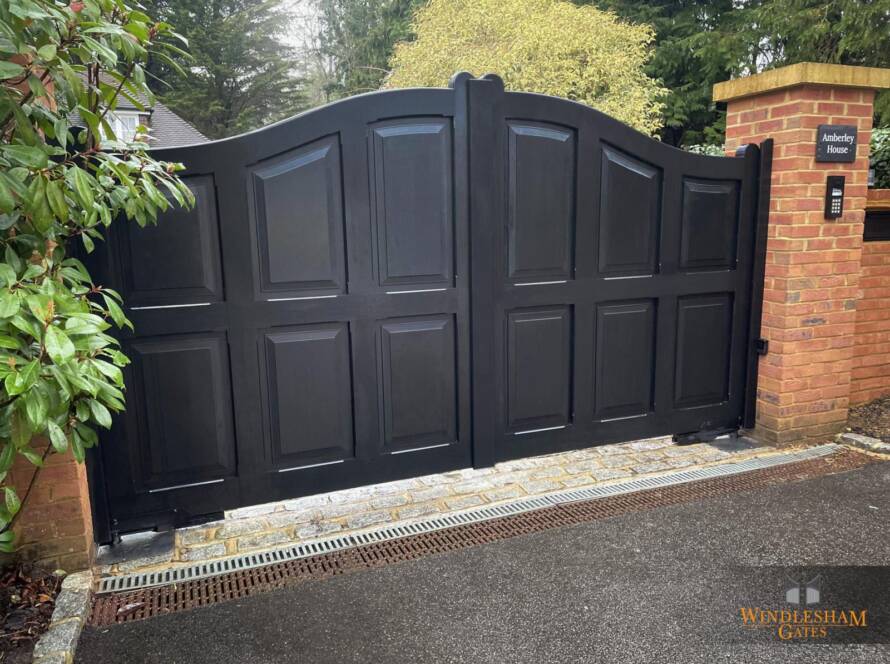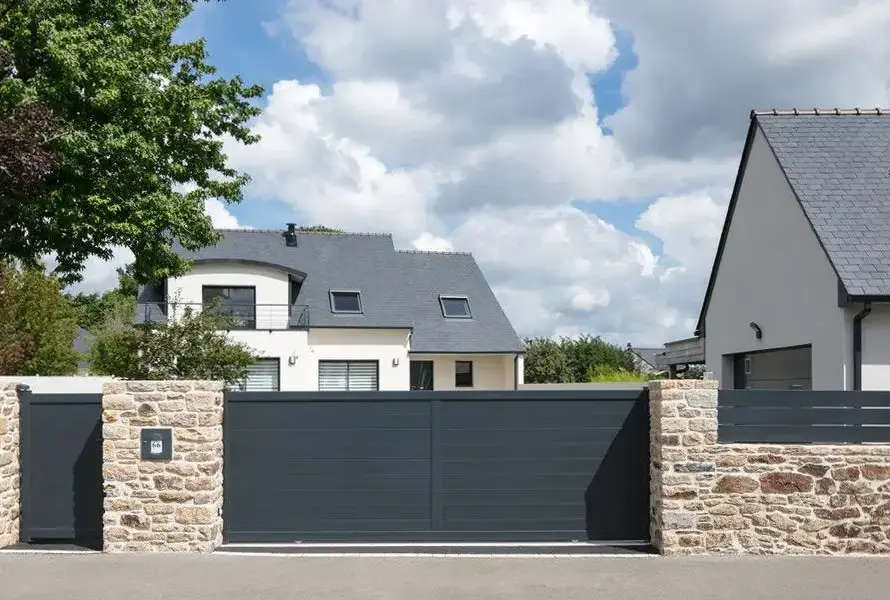With increasing importance placed on sustainability, more of us are considering the impact that our decisions have on the planet. Eco-conscious home design is now a top priority, and this extends to homeowners looking to install bespoke electric gates.
As one of the leading specialists offering bespoke electric gates in Surrey, Windlesham Gates has always believed in the harmony of design, function, and sustainability. More than just security features or luxury statements, today’s electric gates for eco homes reflect a commitment to energy efficiency and green living.
So, how energy efficient are modern electric gate systems? Do electric gates increase energy bills? These are among the most common questions we hear from homeowners looking to balance elegance, practicality, and environmental responsibility.
Here, our team will explore the key factors that influence electric gate energy consumption, uncover what makes a system efficient, and show why investing in energy efficient electric gates is a wise move. Essentially, it is a comprehensive guide for discerning Surrey households seeking to build eco homes with low operational costs and high aesthetic value.
Understanding How Electric Gates Use Energy
At the heart of the conversation around energy usage is this simple question: do electric gates use a lot of electricity? The answer, in short, is no.
Modern gate systems are remarkably low-energy compared to other everyday household appliances. The motors that operate gates (typically 24V DC or 230V AC) primarily consume energy during motion.
During active operation, a typical opening or closing cycle takes around 15 to 20 seconds, drawing approximately 700 watts during that time. Between operations, gates remain in standby mode, consuming a modest 80 to 100 watts per day thanks to their control board and sensors.
On average, swing gates use slightly less power when cycling than sliding gates, but sliding gates are efficient enough that the difference in real-world running costs is minimal.
Do Electric Gates Increase Energy Bills?
The good news is that modern electric gate operation has a negligible impact on household bills. In practical terms, for a Surrey property using its electric gates 10 to 15 times per day, the electric gate running costs are around £15 to £20 per year, or £0.28 per week.
To put this in perspective, boiling a full kettle just once costs 6p on average. Even if you only boil it once per day for a week, it is still more expensive than daily electric gate use over the same period.
What Makes an Electric Gate Energy Efficient?
What defines energy efficiency in electric gate systems? Several technical and material considerations make a significant difference. At Windlesham Gates, we focus on designing and installing low energy automatic gates that deliver both style and sustainability.
Motor technology is central. We use brushless, low-voltage 24V motors designed to reduce current draw while maintaining high performance. Brushless motors are quieter, longer-lasting, and far more efficient than older motor designs.
Gate weight and material also play an important role. Heavier gates demand more energy to operate, so more lightweight materials like aluminium and Accoya wood are ideal. They are not only visually stunning and durable, but also have environmental credentials that reduce the carbon footprint of your electric gates.
Smart control systems complete the efficiency picture. Features like sleep mode, auto-close timers, and intelligent access sensors ensure your gate only operates when needed, cutting unnecessary standby draw and keeping consumption in check.
Energy-Saving & Eco-Friendly Features to Look For
How energy efficient are modern electric gate systems? It depends on certain key features of the gate. When investing in bespoke electric gates in Surrey, here are the aspects to prioritise for efficiency, energy savings, and eco-friendliness:
- Low‑voltage systems (e.g., 24 V brushless motors)
- Smart energy save modes and standby timers
- Solar options, ideal for off-grid sites or sustainability goals
- Energy-integrated controls, such as motion-activated lighting
- Timer-controlled auto-close to minimise cycles
By combining these technologies, you ensure your gates are both luxurious and eco-efficient.
Eco-Friendly Materials in Gate Construction
The choice of materials has a profound effect not only on the aesthetic appeal of your gate but also on its environmental impact. Sustainable gate materials are increasingly popular, with homeowners becoming more mindful of how their choices affect long-term sustainability.
We’re proud to have been the first electric gate installer to introduce Accoya wood eco gates to the UK over a decade ago. Accoya is a sustainably sourced, FSC-certified timber known for its dimensional stability, weather resistance, and incredibly low environmental footprint. It’s carbon neutral across its lifecycle and ideal for eco-conscious gate projects.
Aluminium is another outstanding choice. Lightweight and 100% recyclable, it reduces the energy demand on motors and is resistant to rust, which keeps maintenance minimal. Even steel and wrought iron, when sourced responsibly, offer long-term durability and recyclability, although they are heavier.
At Windlesham Gates, we can incorporate sustainability from sourcing to finishing, minimising environmental impact at every stage for gates as elegant as they are environmentally conscious.
Solar-Powered Gates: Eco-Friendly & Off-Grid
Sustainability-minded clients increasingly ask about solar powered electric gates in the UK. While the British climate is famously unpredictable, solar technology has advanced enough to make off-grid gate automation a realistic option, even here in Surrey.
Solar-powered systems can operate entirely independent of mains electricity, storing energy in high-efficiency batteries. With as little as 4 to 6 hours of sunlight per day, most systems operate seamlessly, even through the winter months.
They can also reduce electricity use by up to 90% compared to grid-tied alternatives. With lower long-term electric gate running costs and a reduced carbon footprint compared to traditional gates, they’re particularly well-suited to remote estates or eco homes prioritising carbon reduction and self-sufficiency.
Battery maintenance and periodic solar panel cleaning are necessary, but overall, using solar power for your bespoke electric gates in Surrey is a fantastic solution for anyone aiming to lower both their energy bills and environmental impact.
Integrating Gates with Home Energy Systems
Today’s electric gates don’t stand alone. Increasingly, they’re part of a wider smart home ecosystem. Smart home gate automation allows you to monitor and control your gate from anywhere, using your smartphone, a voice assistant, or a home automation hub.
Beyond convenience, this integration can offer meaningful energy savings. You can coordinate gate lighting/security systems with motion sensors (so that they operate only when necessary), prevent idle operation through automatic closing, and even sync the gate with your energy monitoring platform or smart meter to assess usage trends.
Homeowners in Surrey embracing smart technology will find these integrations invaluable, particularly in homes already equipped with solar PV systems, EV chargers, or energy storage units. Electric gates for eco homes are no longer an afterthought; they’re an important feature that supports convenience and sustainability.
The Bigger Picture: Electric Gates within Your Eco-Home
Crafted with sustainability in mind, electric gates for eco homes serve a dual purpose: enhancing the aesthetic and functional value of your property while aligning with its environmental goals.
By automating vehicle entry, electric gates can significantly reduce the vehicle idling caused by manual gate operation, cutting down on unnecessary emissions. Sturdy gates also act as home security, which may minimise the need for other measures such as lighting and monitoring.
When integrated thoughtfully, energy efficient electric gates become an extension of your home’s sustainability ethos. Combined with other features like EV charging points, green roofing, solar panels, and drought-resistant landscaping, they can contribute meaningfully to your home’s green credentials. This is not only good for the planet, but also highly attractive to potential buyers in Surrey’s premium housing market.
Frequently Asked Questions
Q: How much electricity do electric gates use per month?
A: It depends on usage, but typically just £1.25–£1.50/month, approximately 150 kWh in standby and motor usage. Standby draw is about 100 W/day, and active use just 700 W for 20s, costing less than 0.2p per cycle.
Q: Will solar-powered gates work in Surrey’s cloudy weather?
A: Yes, modern systems store energy in batteries and can operate even with limited sunlight. Units often function reliably with 4 to 6 hours of daily sun.
Q: Are modern gate systems more energy-efficient than older models?
A: Thanks to brushless motors, low-voltage electronics, and smart standby modes, today’s gates are far more efficient than earlier models.
Q: Is Accoya an eco-friendly gate material?
A: Absolutely. It’s sourced from responsibly managed forests, chemically modified for durability, and boasts low waste and long lifespan.
Q: Can gates integrate with home smart energy systems?
A: Yes, many high-end systems interface with smart meters, PV systems, battery storage, and even voice control platforms.
Q: Can upgrading existing gates reduce energy use?
A: Yes, replacing older, heavy motors with modern brushless units and adding smart standby features can reduce standby consumption by up to 50%.
Electric Gates for Eco Homes: Energy Efficiency Without Compromise
Modern electric gates offer far more than just security and visual appeal. When designed and installed thoughtfully, they are among the most efficient additions to any property. So, do electric gates increase energy bills? No, and with the right design, they can even support your sustainability goals.
Whether you’re considering low energy automatic gates or bespoke electric gates in Surrey, Windlesham Gates delivers expertly engineered solutions tailored to your needs. Our team will guide you through every step, from concept to installation, to ensure your gates are as efficient and elegant as the home they protect.
To explore the best energy efficient electric gates for your property, contact Windlesham Gates today.



